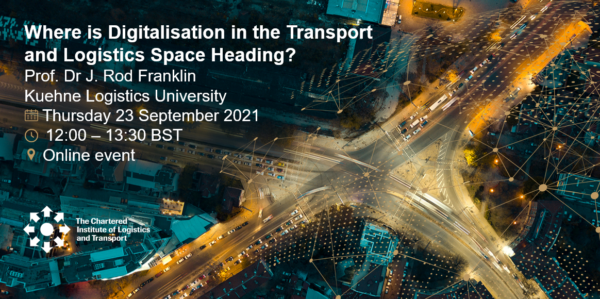An Interview with Professor Dr Rod Franklin

Our world is changing. Digital technologies have advanced more rapidly than any innovation in our history, transforming societies and changing the way we learn and communicate, the way we work, even the way we think. In response, we are pleased to announce the launch of our Digitalisation and Industry 4.0 campaign. Over the coming months we will also be focusing on digitalisation and technology issues in our communications, webinars and social media content, bringing in to focus the changes that are affecting our members and transforming the industry we all share.

On that note, we are very pleased to announce Professor Dr Rod Franklin, Professor of Logistics Practice at Kuehne Logistics University (KLU), as the first guest speaker of our new webinar series. The session will be broadcast on 23rd September at 12:00 noon BST and will consider ‘Where Digitalisation is Heading in the Transport and Logistics Sector’.
Ahead of this session, I was fortunate enough to catch up with Professor Dr Franklin via Zoom, to discuss his upcoming webinar presentation and the wider issues surrounding it. The Professor is a relaxed and friendly presence. I ask about his title (Professor Dr feels a touch formal) ‘I prefer Rod’ he says with a smile.
We start with an outline of his work as Professor of Logistics Practice. ‘I look at the intersection of practice and theory. When I look at things like digitalisation, I’m more interested in how digital technologies are being applied in industry, rather than the theoretical aspect of how you pass information back and forth through networks. I’m interested in that, but that’s not the area where I do my research. I look at the application of these types of technologies or processes. The application of cloud computing in logistics and supply chain, or the application of big data analysis in logistics and supply chain.’
We discuss the realities of studying this material, and I ask whether businesses’ desire to protect any competitive advantage makes research difficult. ‘Actually, it’s easier than you might think. We might end up having to be under a non-disclosure agreement, but the discussion the industry has, is “how best can I do this?”. Because technology requires resources, and they want to make sure they are being efficient in how they apply those resources, and whether or not a technology is appropriate for the problem set that they are exploring. So, it’s a lot easier than you might think.’
We turn to the subject of his webinar, and I ask him to outline the related trends he sees in the supply chain, logistics and transport industries. ‘A continuation of internet-based platforms and their ability to disaggregate what had been traditional manual processes will continue into the future – that’s one major trend. It’s an area we have history on, and we’re seeing in the logistics and transport industry all sorts of novel ideas and concepts coming out of how those platforms can be disruptive to those manual processes.’
He moves on to artificial intelligence. ‘AI impacts many different areas within logistics and supply chain operations. So, things from autonomous trucks, ships and aeroplanes, to more efficient and more capable robotics.’
We discuss the significant technological changes vehicles are going through alongside automation, such as electrification and hydrogen fuel cells. ‘These have a direct relationship to the last release of the IPCC report on the environment where we have to move away from a carbon-based energy model that we currently have, to one that is more sustainable.’
For Professor Franklin, the benefits created by the interaction between these technologies is key. ‘The two factors of business improvement that technology can bring, which are efficiency and different energy sources, come together to generate a better sustainable model for logistics and transport.’
I ask about the internet of things, or what Professor Franklin calls ‘sensor-based technology.’ He sees great advantages in ‘making everything smart, or at least everything accessible from remote locations, so you can find out statuses and things like this.’
‘One area that you hear about all the time is the digital twin, which is integrating a real time simulation that is fed by IoT devices – data collected in real time by IoT – so that you can proactively take action if you start to see some transport operation going off the rails and you want to correct it in real time.’
Such sensor-based technologies ‘can lead to what I call the Holy Grail of supply chain operations and that is end-to-end visibility. So that you are able to understand where the movement of goods are within the entire supply chain, where constraints are occurring so that you can take action, or potentially where problematics in the environment such as temperature rises or humidity, whatever is important to you, are going out of control and take action as well.’
This Holy Grail is not about a single technology, so much as the application and integration of them all. ‘This coming together is a concept that I would call integrated systems. Systems that allow us to better manage things. Because independently adding each one of these technologies is not really all that good for the supply chain. But pulling them together as a system and thinking about your supply chain in a systemic way, and then layering these technologies in is important.’
For Professor Franklin, the discussion of grand potential is all well and good, but the hype has to be tempered by reality. ‘We (at KLU) recently conducted a study in conjunction with (German enterprise software giant) SAP on the adoption of digital technologies. This was an update of a study that was originally done in 2014.’ The Professor explains that in 2014 people surveyed discussed what technology they were implementing then but also what they expected to be implemented by 2020.
‘So, we wanted to see “what was the reality? What did the actually do?” And very much in line with what is called the Gartner Hype Cycle, what was very hot technology in 2014, people came to realise there perhaps wasn’t a business case for, or a skill set shortage got in the way of implementation. So, when we talk about technology, we have to take the hype out and look at the reality of how business has to be operated. Businesses run on profit. If technology is just another thing that they have to spend money on they’re not going to invest in it, because they can’t see a return.’
To Professor Franklin’s mind, this is one of the key misunderstandings surrounding technology and its potential to disrupt industry. ‘There is actually the pragmatic issue that all the people who hype technology fail to address. Business is not a science project, business is a profit-making process. If you can’t demonstrate a return on investment within the timeframe that executives are graded, most businesses will ignore the technology. And that’s why we see this long cycle before absorption of technologies.’
Professor Dr Rod Franklin’s webinar ‘Where Digitalisation is Heading in the Transport and Logistics Sector’ will be broadcast on 23rd September at 12:00 noon BST. Members can register for the event here. Non-members are welcome to join proceedings via Facebook live – the webinar will be posted to our page Facebook.com/CILTInternational.
